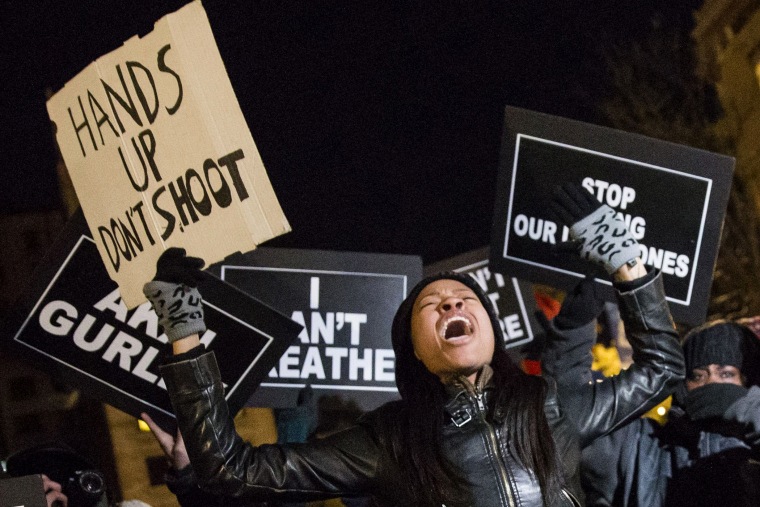For the sixth night in a row, protesters took to the streets nationwide to take a stand against recent grand jury decisions not to indict two police officers who killed two unarmed black men.
The protests ranged from the whimsical—in New York, activist sang modified Christmas carols, such as “Oh Little Town of Ferguson” and “All I Want For Christmas Is an Indictment”—to the more combative, like in California, where officials reported that protesters blocked lanes of traffic on Highway 24 in Oakland and looted and vandalized stores in the Berkeley area. One BART station was temporarily shut down. Police deployed tear gas on the protesters for the second night in a row, and arrests continued. One firework was thrown at officers.
The continued protests are the latest symptom of brewing racial tension and mistrust in police that's gripped the country since August, when 18-year-old, unarmed Michael Brown was shot dead by police officer Darren Wilson, prompting weeks of protests and subsequent police crackdowns that only encouraged more protests. More protests are planned in New York on Monday, too, signaling that the movement isn't slowing down any time soon.
Related: After Ferguson, some see a movement taking shape
In Seattle, some were arrested after rocks were thrown at police officers who kept protesters from demonstrating on a public roadway.
In New York’s Union Square—the site of the first protests after a jury decided not to indict the officer who killed Eric Garner in Staten Island, despite a video showing the officer using an apparent chokehold on the man—hundreds gathered, disrupting traffic and chanting “hands up, don’t shoot,” a common protest chant from the Ferguson protests.
In Miami and Philadelphia, protesters blocked traffic during peaceful protests—in Philadelphia, there was a “die in” in one major intersection, where protesters laid in the street, mimicking those who have fallen and perhaps more specifically, Ferguson’s Michael Brown, whose body was left in the street for hours after he was killed.
Meanwhile, the Justice Department is conducting a civil rights investigation into both cases and public officials are urging calm as the country attempts to handle the unrest and country’s racial divide.
That divide was particularly apparent in a recent NBC News/Marist poll, which saw huge racial disparity in how Americans perceived the recent grand jury rulings: seventy percent of blacks said the decision decreased their confidence in the justice system, while just 35% of whites said their confidence was decreased.
"This isn't going to be solved overnight," the president said in an interview that's expected to air tonight on BET. "This is something that's deeply rooted in our society, deeply rooted in our history. But the two things that will allow us to solve it: Number one: Is the understanding that we have made progress and so it's important to recognize that as painful as these instances are, we can't equate what's happening now with what was happening 50 years ago. If you talk to your parents, grandparents, uncles, they'll tell you that things are better,"
